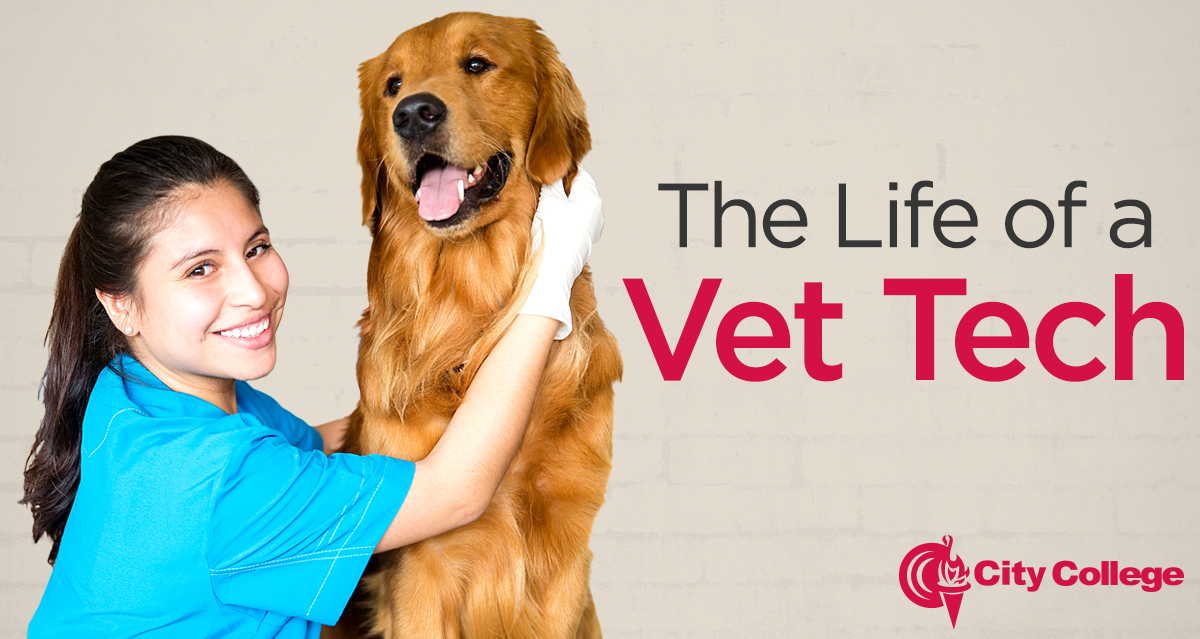
Vet Tech Life – An Inside Look
If you look up the definition of a Veterinary Technician in the urban dictionary, you’ll probably agree it is a fitting one. VET-ER-I-NAR-Y TECH-NI-CIAN – Noun; 1. Lover of animals. 2. Calmer of Humans 3. Clinic necessity. Yes, a vet tech has many roles in a veterinary clinic and most veterinarians would agree that they are not only important team members; they are an absolutely essential part of a successful practice. After all, next to the full-fledged Veterinarian, the vet tech is the most qualified professional capable of providing care and support to our furry, feathered and scaly friends of all shapes and sizes. If you’re considering a career in the veterinary world, here are some things to know about all things Vet Tech.
What duties does a vet tech perform on a regular basis?
Generally speaking, a vet tech provides direct support to the veterinarian while they treat and/or diagnose a patient. While a vet tech’s duties may vary from practice to practice, some of the routine activities you could expect might include:
- Greeting patients and performing initial triage
- Performing physical exams
- Drawing blood or other samples for evaluation
- Assisting with or performing x-rays
- Sterilizing and preparing surgical equipment
- Monitoring vital signs
- Administering medications and immunizations
- Dental care
- Record upkeep
- Client communication and education
Vet techs are also trained in proper handling and restraint of animals to ensure the safety and well-being of the patient and the staff.
Do I have what it takes to be a vet tech?
Needless to say, being a vet tech requires not just the right training but also some unique characteristics in a person. Obviously, a passionate interest in animal welfare is key but veterinary technology is a science, so it helps to have a passion for science as well. Working as a vet tech means you’ll be dealing with emergencies and sometimes, very emotional human and non-human clients. So, maintaining a calm, yet compassionate demeanor is critical. You’ll also need to be physically capable of handling large patients and must be able to be on your feet for long periods of time. Throw in some excellent people skills and a non-squeamish nature and you have the makings of a top-notch vet tech!
What are the requirements to become a vet tech?
The majority of veterinary technology programs across the country are AVMA (American Veterinary Medical Association) approved 2-year programs that require a high school diploma or GED as a prerequisite. Upon completion, students graduate with an Associates of Science Degree and are able to seek certification by taking the VTNE (Veterinary Technician National Examination) exam. Passing the VTNE exempts graduates from taking any state licensing exam, making graduates eligible to officially work as a certified, registered or licensed vet tech. (The designation varies from state to state.)
Saving one pet might not change the world, but one pet can surely change someone’s life for the better. Deciding to pursue a career helping the pets we love and animals in general, takes a special person and it’s safe to say that life as a vet tech is never going to be dull. If you’re ready to get started on getting the training you need to do what you love for a living, City College is a great place to start. City College’s Veterinary Technology Program is designed to cover all the important, core clinical studies in veterinary technology but also to prepare students for real-life veterinary situations through valuable, hands-on externships at local veterinary practices. Approved by the AVMA, the Veterinary Technology Program is offered at City College’s Gainesville and Hollywood campuses and classes are beginning soon! Don’t wait another day. Call now to learn more.


